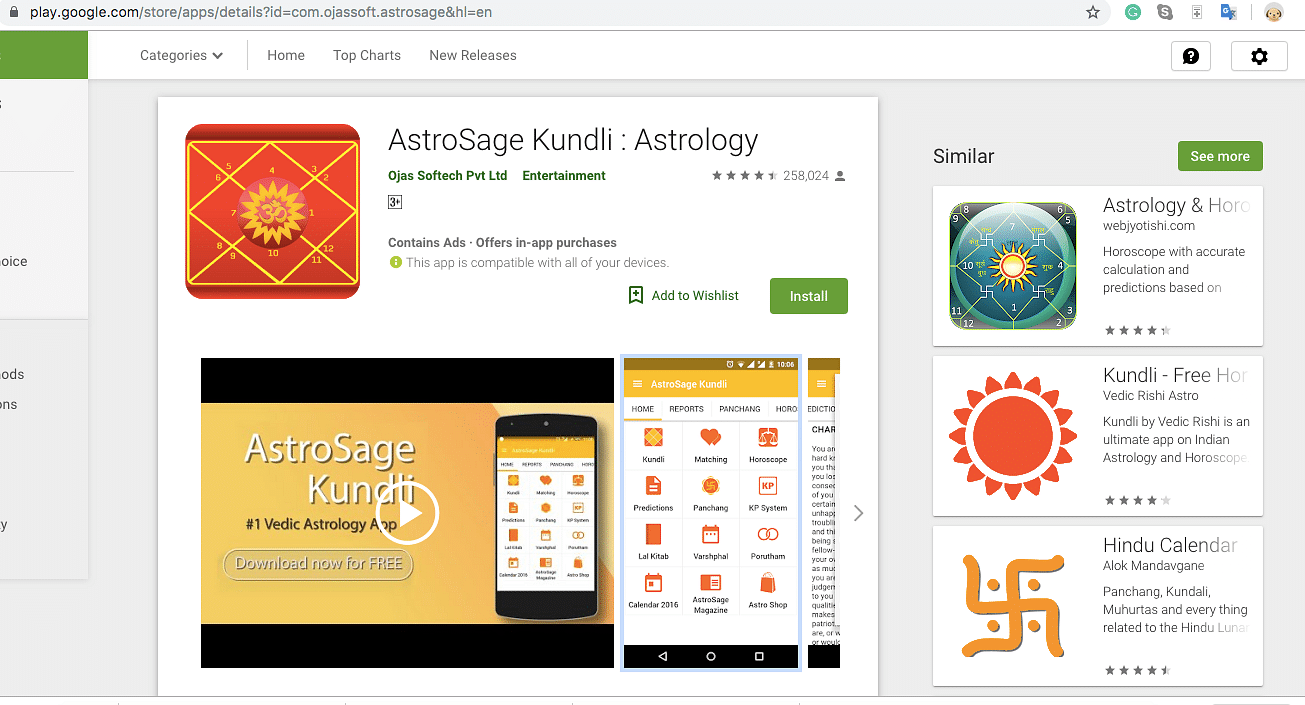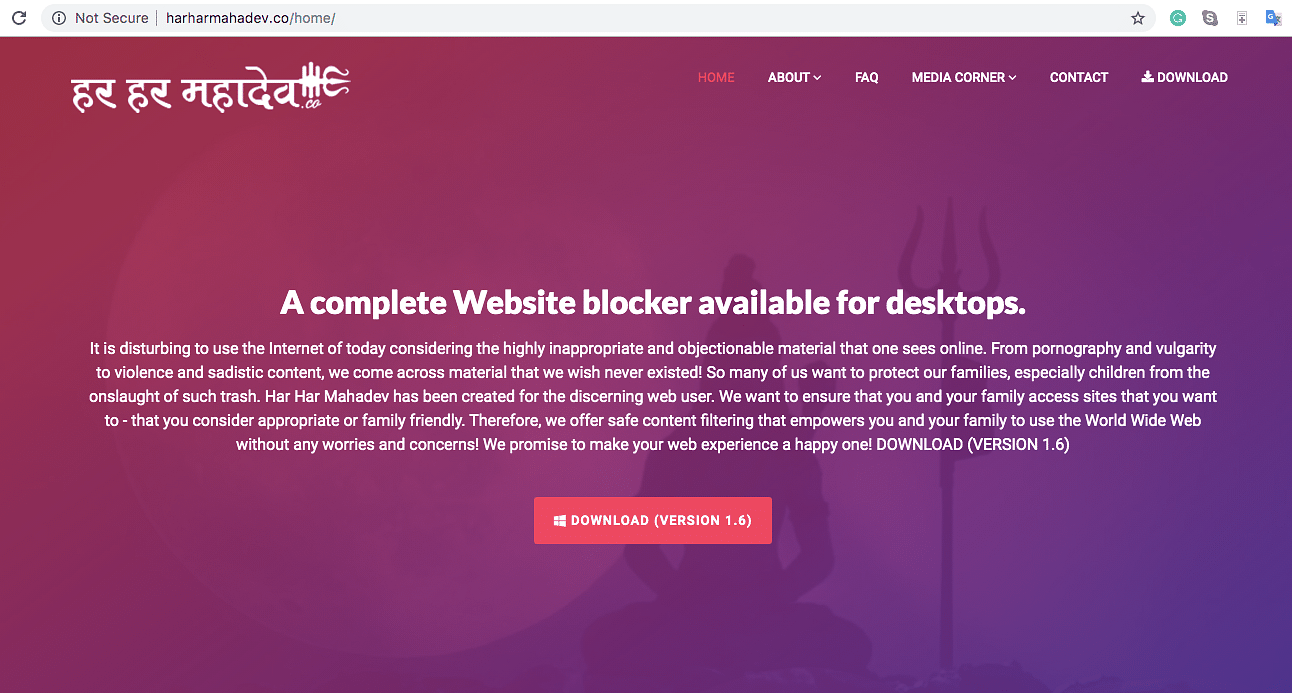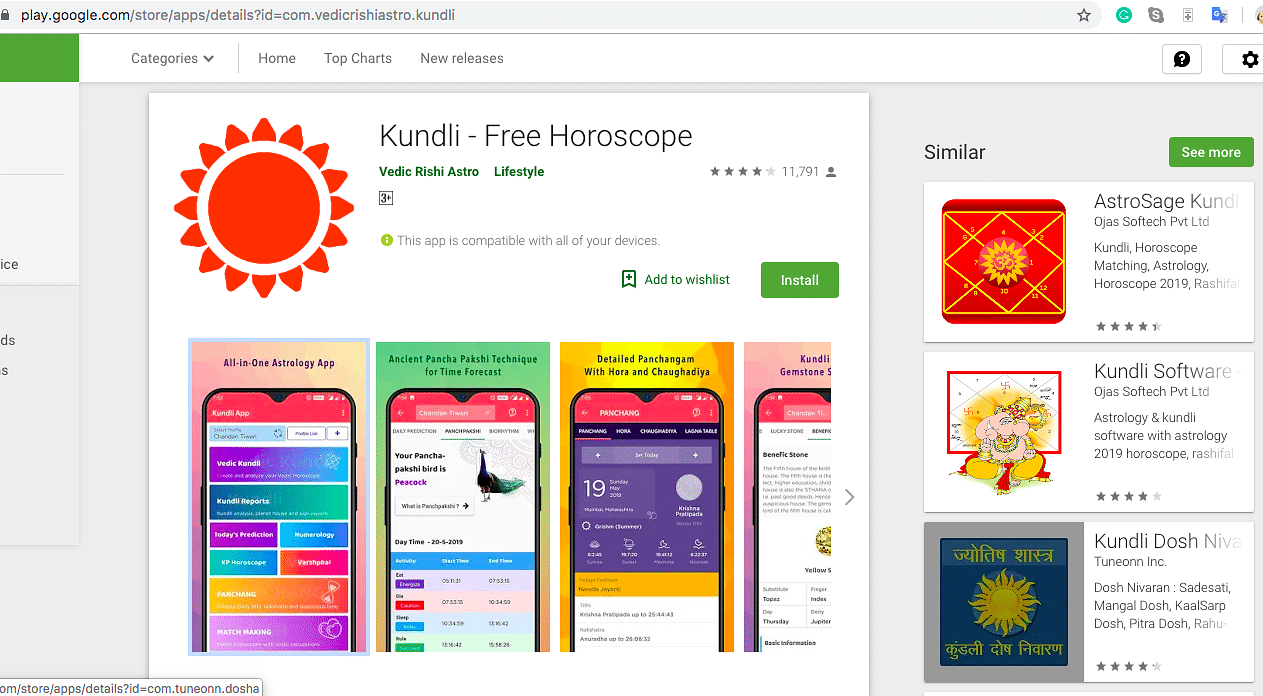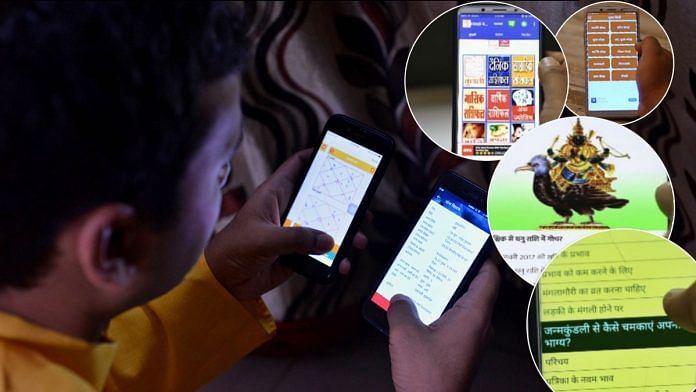New Delhi: In the marketplace of spiritual enlightenment, traditional gurus, rishis, fortune tellers and astrologers have found competition in an unlikely place — your mobile phone.
Sangeeta Bhardwaj, a Zambia-based former teacher in her mid-50s wanted to run an astrological background check on her future daughter-in-law. She wanted to make sure the “matching of the kundlis didn’t show any dosha (unfavourable outcomes) before the wedding”, she tells ThePrint.
But instead of consulting a family pandit or astrologer, she simply typed
www.astrosage.com into her address bar.
In the past two years, Bhardwaj has used AstroSage’s “click-of-a-button horoscopes” to check whether it was the right time to travel or undertake any major financial transaction, and if the upcoming few months would place any significant obstacles before her.
“I don’t adhere to it very strictly though,” Bhardwaj insists. “It’s infrequent and mostly for fun.”
Developed by Punit Pandey of Ojas Softech Pvt Ltd, the website has now branched off into AstroSage Kundli, an app with over 1 crore downloads on the Google Play Store alone, and a cross-platform reach that exceeds 3 crore.

“In 1995, I was working at my cousin’s computer hardware company in Agra, and while Indian customers were willing to pay for a decent system, they always wanted pirated software,” Pandey says. “Of this software, the first thing they would ask for was Microsoft Word, and the second — a kundli-matching programme.”
After he completed his Master’s in computer management from Agra University, “I was already thinking of the next big thing”.
“I had, after all, been coding since I was 10,” adds Pandey.
“I started developing a kundli app for palmtops back in 2001, thinking that everyone would be carrying a smartphone within the next two years, but I was perhaps a decade too early,” Pandey laughs.
His company went bankrupt, putting him on an international flight to greener pastures, “but the website still existed, and by 2003, with part-time work put into it from abroad, the traction had started doubling at warp speed”.
The demand for bhajans, kundlis, spiritual meditation and Hindu deity wallpapers was so high in India, that Pandey eventually left behind a green card and well-paying job in Chicago to reap the benefits of his software company back home.
Also read: ‘I don’t f**k fascists’: How politics is shaping the dating lives of Indians on Tinder, Hinge
Whatever your sanskaar, there’s an app for it
AstroSage — “World’s No. 1 Astrology Portal & App” — is only one of the hundreds of sanskaari apps that flood the Indian tech market today.
If you open AstroGuru and tap on the palmistry section, your camera comes on, scans the surface of your palm and reads your love, life and health lines in real time.
PUJA: Mobile Temple Pooja for Indian Hindu Gods lets you “Carry your puja accessories and idols of Gods with you wherever you go”, and Har Har Mahadev, the infamous brainchild of Dr Vijay Mishra, a neurologist at Banaras Hindu University, plays devotional songs every time you try and access a pornographic website.
“While we can’t stop the adults from watching porn, we can at least stop children,” Mishra says, asserting that his primary motivation was to “prevent addiction to porn that is spreading like an epidemic in society”.
“We found a large number of cases of convulsive nonepileptic seizures (CNES) in young girls and boys under the age of 20, the most common cause of which is depression and sexual violence against children.” he adds.
“A staggering 68 per cent of them had such (sexual) trauma in their lives,” says Mishra, and “when we reviewed the cases, we found that they were linked to repeated exposure to pornographic content”.
Har Har Mahadev doesn’t make any profits, Ankit Srivastava, the web application developer tells ThePrint, “because it’s free, and we merely wanted to help society rid itself of this affliction”.
As of today, the desktop programme has been downloaded over 20,000 times and accessed in over 52 countries, and blocks over 3,800 URLs automatically. “However, parents can manually add other websites they want blocked,” Srivastava adds.
When it comes to using the fear of god to stop people from watching porn, Har Har Mahadev doesn’t discriminate — for Hindus, the titular chant is enough, while Muslims hear “Allahu Akbar”, and others are presented with quotes from the likes of Mahatma Gandhi, A.P.J. Abdul Kalam, Martin Luther King Jr.

Google and Apple, however, haven’t been as supportive of Mishra’s vision, denying him the permits to get his app licensed on their respective app stores.
“There’s just too much money and vested interest in the industry,” he laments, “but we won’t stop trying.”
In battle between science and sanskaar, commerce wins
What emerges from conversations with app developers is an intriguing overlap of the use of mainstream science — engineering, neurology and computer management — with content that encourages traditional, imperfect modes of thinking.
The CEO of VedicRishi, Chandan Tiwari, has an engineering degree, as does Pandey, while PUJA founders Arun Narayanan and Sreeja S. Nair both come from tech backgrounds and Dr Mishra is a certified neurologist. Yet many of these science-educated people don’t see it that way.
Take, for example, the multitude of astrology apps. The position of astrology (the study of stars and planets in the belief that they impact human affairs) within the domain of science has been vociferously contested across the world — except in India, where the Bombay High Court declared it a science in 2011.
For those looking for it, there’s even an app called Garbh Sanskar in Hindi, whose description reads — “Garbh Sanskar, a scientifically proven fact, is an amazing way of teaching/educating and bonding with unborn baby in womb during pregnancy”.
“Also, traditionally, it is believed and now scientifically proven that a child’s mental set-up along with personality is greatly influenced by the thoughts of mother during pregnancy,” the description adds.
The paradox of scientists creating kundli and bhajan apps is, however, explained as what Mandar Kagade, a regulatory policy expert, calls an “agnostic medium of delivery”.
“Think about technology as being distinct from science or scientific temperament, because by virtue of being a medium of delivery, it cannot but be content-neutral — it does not discriminate based on the kinds of apps it carries,” he says.
Further, “religion is a commodity like any other, except that it’s a spiritual good as opposed to a material one, for which the demand is likely to never cease”, he adds.
“If you’ve got content, sticky eyeballs through good user experience (UX) design, cross-platform selling opportunities and a wide consumer demographic that cuts across education and class, then for engineers to be creating bhajan apps is quite rational — you’re essentially Netflixing religion,” he says.
VedicRishi’s Tiwari — an engineer raised in a deeply-religious family from Varanasi — also believes that the two aren’t mutually exclusive.
“I’m not an astrologer, but I know how astrology works. I’m not saying that this is a science — because that’s something which is empirically provable through experimentation,” he says.
“But not everything can be understood through that paradigm,” he adds. “Even poetry and literature have a certain set of rules, through which inferences and analyses are made — trends in a particular author’s work can be mapped, but you can’t have an emotional system that is constantly being measured through a scientific framework.
“It is an art or an institution, one can say — where you get an answer, but you can’t be sure how you got that answer,” Tiwari says. “It’s not 100 per cent science or 100 per cent speculation.”
Pandey adds, “Astrology is like artificial intelligence and machine learning, no one is entirely sure how that works, but it does.”
Also read: Want to track your child’s every move? It can put them more at risk & harm your bond
Marriage, career & going abroad — what Indians want
Whether or not the scan of your palm yields accurate results “is just a matter of trust”, former teacher Bhardwaj says, and “for people that really follow this, I’m sure it’s there”.
India, it appears, has expressed trust in the veracity of kundlis in large numbers. VedicRishi is present in over 188 countries, but “75 per cent of the users are from India”.
The mobile app has crossed 10 lakh downloads in just one year, and the website has grown 10 fold in the last six months, recording 30 to 40 lakh page views per month and 1.2 lakh page views every day with over 20,000 users.

Tiwari, like Pandey, says he has spent next to nothing on advertising and marketing costs — “it’s all organic. This is just what people are looking for online”.
And what people want from these apps is also unanimously clear — love, marriage, a good job and to be settled abroad.
After Tiwari started a chat bot on his page a few months ago, he received 30,000 questions within three weeks.
“Around 35-38 per cent of people asked about marriage, love, weddings and match-making, below which ranked jobs and careers, and third is foreign transfers — ‘Will I get a green card, will I go to Canada, can I go to the US?’,” says Tiwari. “A lot of Indians seem to be concerned about that.”
The comfort of relative anonymity also allows people to “talk about things they wouldn’t share otherwise”, adds Pandey. Many users approach the app with sex-related issues, “problems in their private lives, as well as more serious concerns like AIDS and HIV”.
Around 70 per cent of Pandey’s users are men, with Maharashtra and West Bengal accounting for a significant chunk of online traction.
It’s not just within India, though. AstroSage sees an annual growth of 50 per cent in terms of revenue, has 75 employees at its Noida office, and has received approximately 10 lakh hits from Bangladesh and around 5 lakh hits from Pakistan in the last 30 days.
“Very big political leaders also use our platforms very frequently,” Pandey shares, unwilling to divulge their names under the company’s privacy policy. “But it’s across the political spectrum. See, astrology runs very deep in India, its belief system cutting across caste, class and party lines. It doesn’t matter if you’re Right or Left, you’ll probably check your kundli.”
Even the app developers themselves sometimes use these apps. Arun Narayanan and his wife, who co-founded PUJA, “play chants on loop when stressed, but don’t really chant along”.
Pandey consults his kundli to predict minor everyday events like “when will the electricity come back, or how much sale will my company see today”.
Mishra, though, is the exception. He says he does not watch porn.



